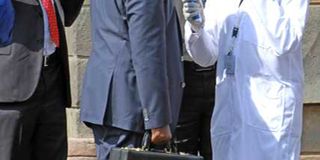2020/21 Budget: Yatani’s first event a low-key affair

National Treasury CS Ukur Yatani (centre) has his temperature checked when he arrived at Parliament Buildings, Nairobi, on June 11, 2020 to read the 2020/2021 national budget statement. PHOTO | JEFF ANGOTE | NATION MEDIA GROUP
What you need to know:
- With the traditional briefcase in his hand, Mr Yatani was ready to tell Kenyans how the government will collect Sh1.62 trillion to finance the Sh2.7 trillion budgeted for the 2020/21 financial year.
- Unlike in the past, when Kenyans did not know what the briefcase held in store, the budget reforms that came with the new constitution in 2010 have made budget-making a public process.
- It is no longer a secret of the Executive, but rather a largely public and participatory process driven by Parliament.
At exactly 2.40pm, National Treasury Cabinet Secretary Ukur Yatani arrived at Parliament Buildings to present his maiden budget statement.
With the traditional briefcase in his hand, Mr Yatani was ready to tell Kenyans how the government will collect Sh1.62 trillion to finance the Sh2.7 trillion budgeted for the 2020/21 financial year.
Unlike in the past, when Kenyans did not know what the briefcase held in store, the budget reforms that came with the new constitution in 2010 have made budget-making a public process.
It is no longer a secret of the Executive, but rather a largely public and participatory process driven by Parliament.
Before proceeding to the waiting room, Mr Yatani, accompanied by his Chief Administrative Secretary Nelson Gaichuhie, PSs Julius Muhia (Finance) and Saitoti Torome (Planning), had to sanitise his hands and have his temperature taken.
They then proceeded for a photo session with National Assembly Majority Leader Aden Duale, Minority Leader John Mbadi, Budget Committee Chairman Kimani Ichung’wah, his Finance and National Planning counterpart Joseph Limo and House Clerk Michael Sialai.
At 2:58pm, the CS and his two PSs were ushered into the chamber.
They sat at the Public Servants Bench while the others headed to the diplomatic boxes and the Speaker’s Gallery to watch the proceedings.
Immediately the CS sat down, House Speaker Justin Muturi interrupted the House business to allow him to present the budget highlights and revenue-raising measures for the national government.
Although MPs and parliamentary staff may access the chamber when the House is in session, Standing Order 25A provides that the Speaker may designate a suitable place in the Chamber or at the bar for the Cabinet secretary responsible for Finance to make a public pronouncement of the budget policy highlights and revenue-raising measures for the national government as stipulated in the Public Finance Management Act.
In line with this provision, Speaker Muturi designated a place to the right of the Speaker’s seat and adjacent to the Public Servants’ Benches for Mr Yatani to deliver his presentation.
At 3:02 pm, the Speaker invited the CS to make his presentation.
At exactly 3:03pm, the CS started his presentation, which went on until 4:34 pm.
At 4:35pm, Mr Muturi announced the adjournment of the House until next Tuesday and then left the chamber, followed by the MPs.
The CS and his PSs left through the rear exit.
In compliance to the social distancing requirement, only 66 MPs were allowed into the debating chamber.
They included the House leadership, including Deputy Speaker Moses Cheboi (Kuresoi North), Mr Duale (Garissa Township), Mr Mbadi (Suba South), Majority Whip Emanuel Wangwe (Navakholo), his minority colleague Junet Mohamed (Suna East) and their deputies.
The four members of the Speaker’s panel, the 27 members of the Budget and Appropriations Committee and chairpersons of the departmental and select committees were also present.
Other members followed the proceedings from designated areas.
In April, Speaker Muturi issued guidelines designating specific areas within Parliament Buildings as extensions of the debating chamber.
The areas have TV monitors that allow members to follow the proceedings and contribute to debates as well as vote.
The designated areas include the restaurant, the members’ lounge and the tents.
Previously, judicial officers, Cabinet secretaries, principal secretaries, members of the diplomatic corps, military generals, heads of state corporations as well as constitutional commissions and independent office holders would be invited to follow proceedings from the Speaker’s Gallery.
The advent of Covid-19 also meant that only 12 visitors from the National Treasury occupied the Speaker’s Gallery and had to strictly observe social distancing.
It was notable that the traditional cocktail party was not held, as Speaker Muturi announced that everyone was free to leave at their pleasure.
The party is an arrangement of the National Assembly to celebrate the occasion and also invite officers from the three arms of government – the Executive, Parliament and Judiciary to mingle freely and compare notes.
The occasion also provides journalists with an opportunity to interact with the MPs, policymakers and judicial officers to get their views.
The event usually takes place in the debating chamber and is synchronised with the budget cycles of Tanzania, Burundi, Uganda, Rwanda and South Sudan, which recently joined the East African Community.





